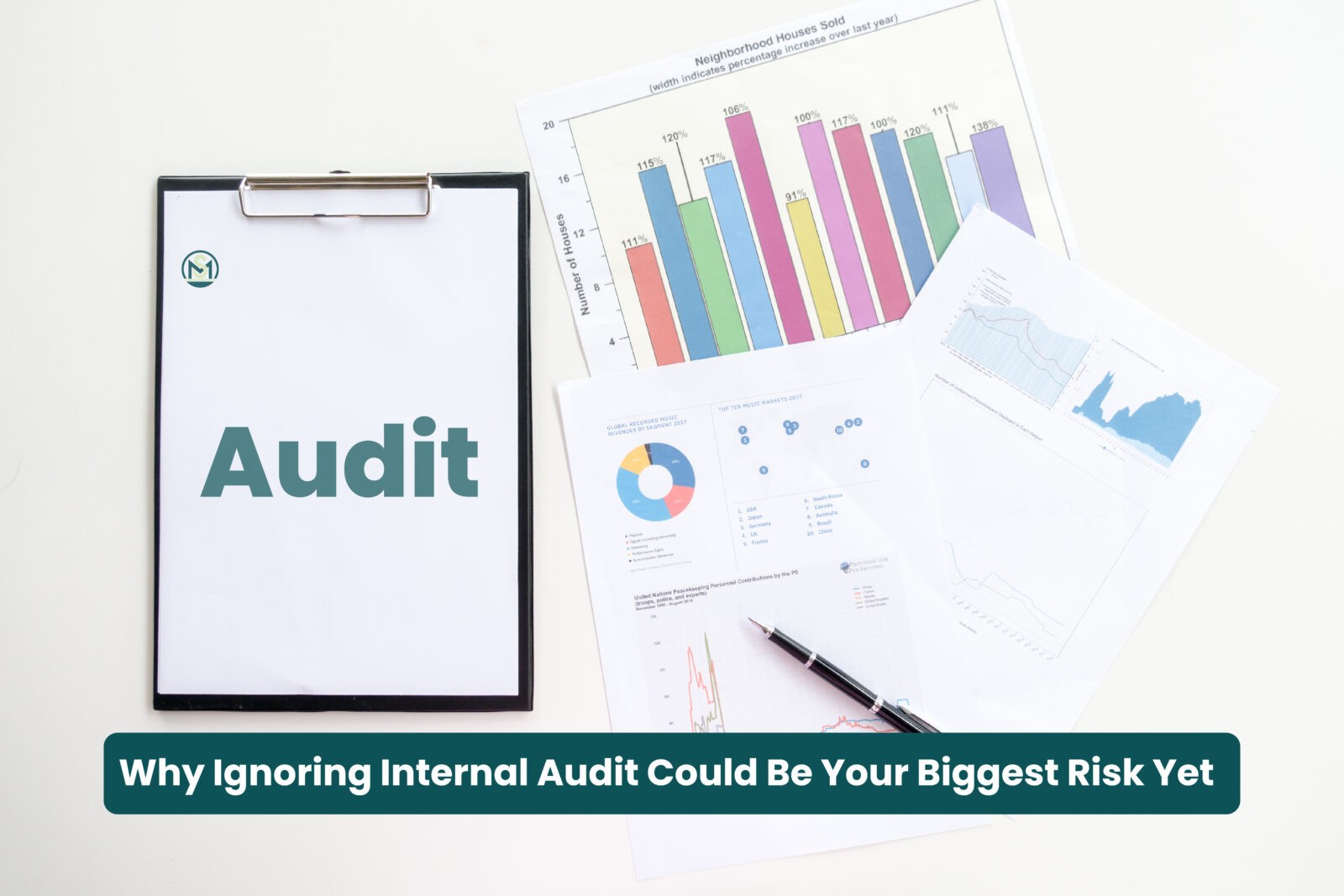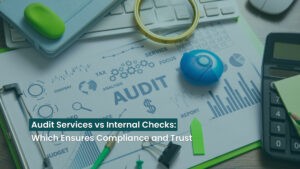When “Everything Looks Fine” Is the Real Danger
Most businesses only think about internal audits when something goes wrong, like a financial misstatement, a compliance penalty, or even fraud. But waiting for disaster to strike before paying attention to internal audits is like driving without a seatbelt just because the car hasn’t crashed yet.
Ignoring internal audit is one of the most overlooked yet dangerous habits a business can fall into. It creates blind spots in operations, weakens control systems, and allows small issues to grow into major financial and legal threats.
In this blog, we’ll walk through exactly why ignoring internal audit isn’t just an oversight, it’s a ticking time bomb. We’ll also look at how it affects everything from compliance to reputation, and what you can do to fix it before it’s too late.
What Does an Internal Audit Actually Do?
Let’s keep it simple. An internal audit is your business’s built-in health check. It reviews your financial systems, operational processes, compliance efforts, and risk management to make sure everything runs as it should.
Now, imagine ignoring that health check for years. Would you trust the system to keep running without issues? Probably not. That’s exactly the danger businesses walk into when ignoring internal audit.
The internal audit importance goes far beyond catching errors. It helps your leadership understand how well departments follow policies, if risks are being managed, and whether your strategies are actually working.
The Hidden Risks of Ignoring Internal Audit
You may not feel the impact right away. But behind the scenes, ignoring internal audit creates cracks that slowly widen:
1. Financial Leakages Go Unnoticed
You could be losing money without realizing it. Whether it’s duplicate payments, unauthorized expenses, or inefficient budgeting, internal audit compliance helps catch these issues early. Without it, small errors drain profits silently over time.
2. Fraud Becomes Easier
When no one is watching, bad actors get bold. Lack of auditing makes fraud detection harder. One study by the Association of Certified Fraud Examiners showed that companies without internal audits suffer twice as much financial loss due to fraud.
That’s why the risks of ignoring internal audits should never be underestimated. Even honest employees can make poor choices when controls are missing.
3. Compliance Slips
Rules change. Whether it’s tax laws, environmental regulations, or industry standards, staying compliant is an ongoing job. Ignoring internal audit leaves you vulnerable to non-compliance fines, lawsuits, or license revocations.
The cost of skipping internal audits here is not just monetary; it can include public embarrassment and legal liability.
Internal Audit and Corporate Governance: The Missing Link
Strong corporate governance depends on accountability. But if no one checks whether departments follow policies or measure risks, how can leadership hold anyone accountable?
That’s where internal audit importance shows up. It gives the board and senior management independent insights about performance, compliance, and potential problems. Without it, decision-makers work in the dark.
When businesses start ignoring internal audits, they also weaken their corporate governance. And weak governance attracts risks,from poor investments to data breaches and ethical violations.
Real Stories: When Ignoring Internal Audit Backfires
Let’s look at two real-world examples :
Case 1: The Manufacturing Mishap
A mid-sized manufacturing company ignored internal audits for three years, assuming their ERP system would catch any financial issues. But when a routine audit was finally done after an external complaint, they found $300,000 in inventory fraud by warehouse staff. The delay in detection made legal recovery nearly impossible.
Case 2: The Tech Startup That Skipped Checks
A growing tech startup wanted to “move fast and break things.” In their rush, they skipped internal audits and ended up violating data privacy laws. They had no way of proving that customer information was properly handled. The cost of skipping internal audits came in the form of a $100,000 fine and damage to investor trust.
These are not isolated cases. The risks of ignoring internal audits show up across industries.
Skipping Internal Audits Doesn’t Save Money, It Wastes It
A common excuse for ignoring an internal audit is cost. “We don’t have the budget.” But think about it: skipping a regular check-up to save a few thousand now can easily lead to losses in the hundreds of thousands later.
You might avoid audit costs in the short term, but you invite bigger problems:
- Cost of non-compliance penalties
- Cost of fraud recovery
- Cost of reputation repair
- Cost of rework and process re-alignment
The internal audit importance lies in prevention, not punishment. It’s the flashlight that helps you fix issues before they grow costly.
Signs You’re Ignoring Internal Audit Without Realizing It
Not sure if your business is guilty of ignoring internal audit? Watch out for these signs:
- Your last internal audit was more than a year ago
- You don’t have a dedicated internal auditor or team
- Audit findings are filed but never acted on
- You don’t audit key areas like cybersecurity, payroll, or procurement
- Your board never discusses audit reports
If any of these are true, your organization may already be carrying corporate governance risks without knowing it.
How Internal Audit Compliance Builds Business Strength
When done right, internal audit compliance does more than just prevent loss. It becomes a tool for growth:
- Helps align teams with company goals
- Improves efficiency through streamlined processes
- Builds investor and stakeholder trust
- Prepares you for regulatory inspections
- Highlights cost-saving opportunities
Rather than just a watchdog, your internal audit team becomes a trusted advisor.
Steps to Fix the Problem Before It’s Too Late
If you’ve been ignoring internal audit, the good news is that you can fix it, before it’s too late. Here’s how:
1. Start Small but Start Now
Even if you don’t have an audit department, begin with a simple internal control checklist. Review your finance processes, HR practices, and IT systems.
2. Appoint Ownership
Assign someone responsible for internal audit oversight, even part-time. Give them the authority to investigate and report independently.
3. Involve Leadership
Make sure internal audit reports go directly to senior management or the board. This helps tie audit findings to strategic decisions.
4. Train Your Team
Your team should understand that audits are not a “gotcha” game. They’re meant to improve performance. With the right training, staff can support audits instead of fearing them.
5. Review Annually
Set a regular schedule,quarterly or yearly,to perform internal audits. Over time, expand into more areas like cybersecurity, compliance, and operations.
Corporate Governance Risks You Can’t Afford to Carry
Whether you’re a startup or a listed company, corporate governance risks grow when transparency is lost. That’s what happens when you skip internal audits.
- Investors see you as less credible
- Employees work without clear boundaries
- Vendors and partners hesitate to trust your controls
- Regulators view your business as a red flag
- And all of it starts with ignoring the internal audit.
Don’t Wait for a Scandal
Ignoring internal audit doesn’t just leave your business vulnerable; it sends the message that you’re okay with taking unnecessary risks. But you don’t have to run your company that way.
Internal audits are not about control. They are about clarity. They give you the full picture. They catch small problems before they explode. And they show the world that you take your business seriously.
If you’ve been putting audits on the back burner, it’s time to bring them forward.
How MSAFDAR Can Help You Stay in Control
At M. Safdar & Co., we understand how overwhelming it can be to build a solid audit function while juggling daily business pressures. Our internal audit services are designed not only to uncover risks but also to help you build systems that prevent them in the first place.
Whether you need a full audit, risk advisory, or just a check-up on your processes, we’ll tailor our approach to your business needs. We don’t just audit, we guide, we support, and we protect.
FAQs
Q1: What happens if I keep ignoring internal audit for years?
You increase your risk of fraud, compliance failure, and financial inefficiencies. Eventually, these lead to serious legal and reputational damage.
Q2: Isn’t an audit only for large businesses?
No. Even small businesses need audit practices to manage risks and improve operations. Size doesn’t reduce risk; visibility does.
Q3: How does ignoring internal audit affect investor confidence?
Investors see internal audits as a sign of good governance. Ignoring them makes you appear careless with risk management.
Q4: Is an internal audit the same as an external audit?
Not at all. External audits are done for regulatory compliance, usually yearly. Internal audits are ongoing, proactive, and company-driven.
Q5: How often should I conduct an internal audit?
Ideally, you should conduct audits quarterly or biannually, depending on the size and complexity of your business.




